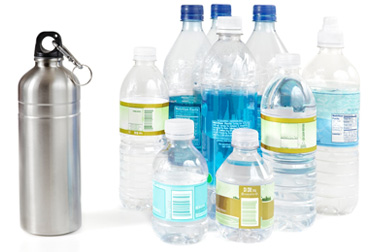
You’re probably already aware of the problem that disposable plastic bottles pose for the environment. They don’t degrade quickly and are in our throwaway society they are major contributors to overflowing landfill sites,
even though they can be recycled. You may not realise that they’re not good for health either.
If you have kids you really should actively get aware about eco-friendly bottles, because of the health hazards associated with some plastics. Phthalates are plasticizers that are commonly used in plastic bottles. These additives are esters that are used to make polyvinyl chloride softer and plastic products more flexible. They don’t form strong chemical bonds and so easily leach out into the environment. Whether that environment is your home or a landfill site it is bad news either way.
Phthalates have been shown to cause birth defects and interfere with hormones in animal testing, and are thought to be dangerous to babies before birth. Phenols used in plastic manufacturer, especially bisphenol A, pose similar problems. Thanks to awareness of the potential hazards of some plastics, baby bottles should be made without added phthalates and phenols, by law.
Going green means limiting the contributions our lifestyles make to environmental pollution. Recycling is one way, but an even more eco-friendly strategy is avoiding disposable items and going for products that can be used, washed and then reused, almost endlessly. Reusable plastic bottles are the obvious choice, but there are also suitable non-plastic water bottles on the market.
Plastic bottles are everywhere because they’re useful, lightweight, durable and cheap. If plastic is what you need, then eco-friendly plastic bottles use non-phthalate plasticizers, which are known to be stable and harmless. Bottles made from bio plastics use vegetable oils, fats and starches, which are renewable resources. Some, but not all, are designed to biodegrade easily. If you want to avoid plastic altogether, you do have a range of options.
Glass bottles have numerous advantages, and with recycled glass you’ll be going green too. They are heavier, a bit more expensive and shatter more easily, but new products with a protective silicone sleeve are better equipped to survive a knock. You can also get great style for your extra expenditure.
Metal water bottles are another good option, but beware of aluminium. These bottles are often lined with a protective layer to stop leaching, and that may contain bisphenol A. There is still uncertainty about the health hazards of phenol-free linings. Many scientists now reject the idea that there is a link between aluminium containers and Alzheimer’s disease, but the jury is still out on its general safety. Stainless steel is a far better choice, since it’s inert and doesn’t need a sealant inside. Its only real downside, apart from cost, is that it dents more easily.
For water bottle that looks good and will really last, glass or stainless steel types are ideal. Bio plastics are a green alternative if plastic is what you need. By investing in a reusable water bottle you’ll be going green and protecting your health at the same time.

